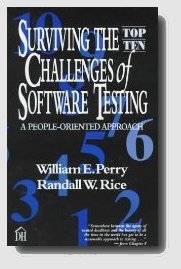
Featured Article
What Does it Really Mean to be Agile?
By Randall W. Rice
This is a question I hear all the time. I hear it from people who find the idea of breaking out of bureaucracy appealing and rightfully so.
So you read the books and go to the conferences about agile success. You would like to try agile approaches to software development and testing, but can't even envision getting developers to sit next to a tester. You can't imagine not producing a thick set of user requirements.
And then you see all the flavors of agile methods and wonder which one is best.
Here's the secret I tell my clients: The magic is not in the method, but it's how you apply the method. I know that's common sense, but it's also the reality. The implication is that many of the varieties of software development methods could work for you if you are smart about applying them.
Here's another secret. You can adopt agile practices and still be slow in delivering projects. I know, it sounds odd, but it's true. You can also experience failed projects using agile.
To me, being agile means being flexible and responsive. It also means delivering business value in ways that make sense. Only you know how to do that in your organization. You know the cultural issues, but you may not know how to solve them. The answer is probably not in a course or a book, but it may well be in learning how to work together better. It may also be in focusing on the 20% of tasks that add value and dropping the other things. Sacrifices will need to be made and some people will be offended, but that's the price of change.
There are some big implications here. What if you have spent years getting to CMMi Level 3 or higher? Do you scrap that effort? Once again, you have to approach this question with thoughtfulness. I believe processes can still be helpful in agile methods. They provide guidance in situations where specific rules are needed. However, I'm referring to just enough process documentation, not the big books that gather dust.
I have two recent blog posts that relate to this topic:
http://randallrice.blogspot.com/2008/09/being-smart-about-agile.html
http://randallrice.blogspot.com/2008/09/more-on-agile-requirements-and-modeling.html
Even if you may not be very agile right now, you can still be very thoughtful about how you build, test and deliver software. That sets you up to be more agile later.
News from Rice Consulting
Testing Service-Oriented Architectures is Now in the Online Format!
I'm excited to announce that Testing SOA is available in online format. You can take this popular and informative course at your own pace. It contains over six hours of narrated slide shows and four hours of exercises.
You can register at:
https://www.mysoftwaretesting.com/ProductDetails.asp?ProductCode=SOA101
You can view a demo at:
http://softwaretestingtrainingonline.com/moodle/course/category.php?id=11
(You can view the demo by logging in as a guest)
New Shopping Cart
I have transitioned to a new shopping cart, which you can find at https://www.mysoftwaretesting.com.
This cart is PCI compliant and makes it easy to register for public and online courses.
Interviwed for an Article at www.cio.com
I was interviewed last week for an article by MIke Kavis at cio.com. You can find the interview at:
http://www.cio.com/article/448970/Six_Questions_to_Consider_Before_Building_a_SOA_Testing_Team?page=1
Podcasts and Teleconferences
The newest podcast on the topic of Agile Testing and featuring an interview with Elizabeth Hendrickson is at:
http://www.riceconsulting.com/home/index.php/Library/software-quality-podcasts.html
Links of Interest
FAA computer failure slows nationwide air traffic - http://blogs.zdnet.com/projectfailures/?p=996
FAA outage due to ‘fix-on-fail’ policy - http://blogs.zdnet.com/projectfailures/?p=1004
Failed government IT: ‘The mother of all databases' - http://blogs.zdnet.com/projectfailures/?p=995&tag=rbxccnbzd1
12 early warning signs of IT failure - http://blogs.zdnet.com/projectfailures/?p=988
Early Warning Signs of IT Project Failure: The Dominant Dozen - http://www.ism-journal.com/ITToday/projectfailure.pdf
Quote of the Month
“IT projects almost never fail because of technical causes, despite the fact that people and process problems may manifest technically…. Technical risks cannot be eliminated, but they can be managed.”
From Early Warning Signs of IT Project Failure: The Dominant Dozen - http://www.ism-journal.com/ITToday/projectfailure.pdf

